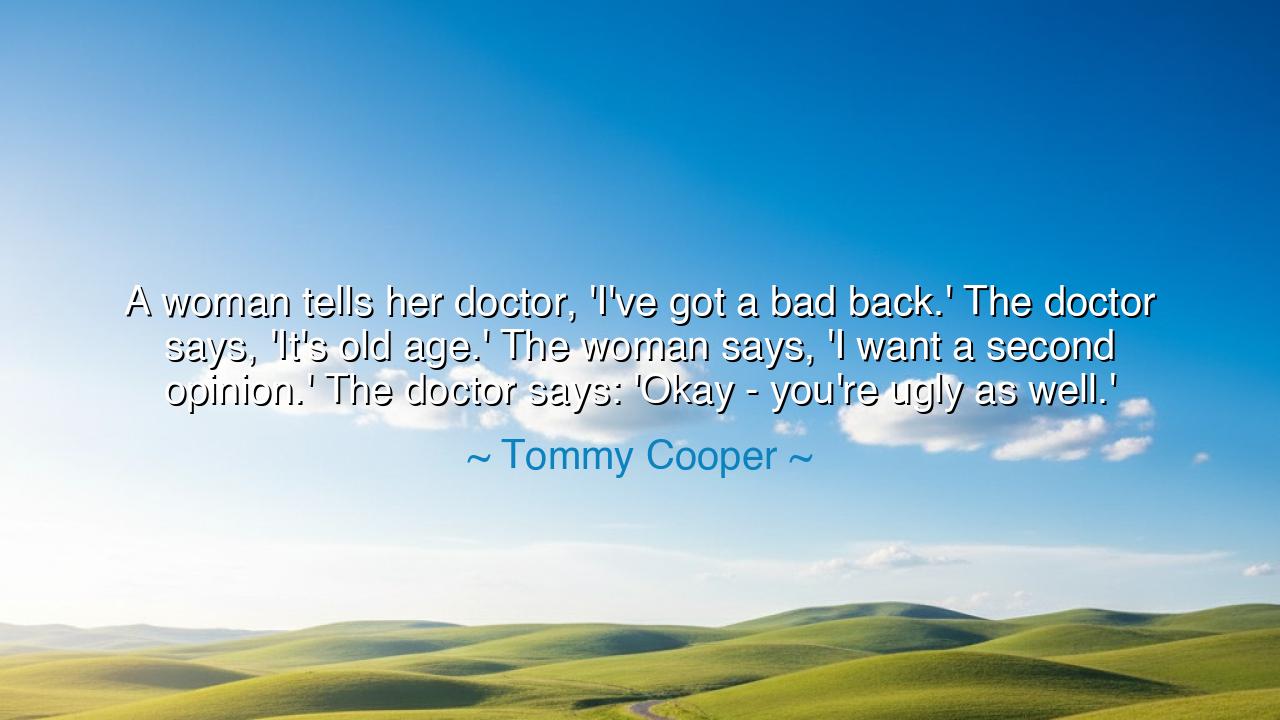
A woman tells her doctor, 'I've got a bad back.' The doctor says
A woman tells her doctor, 'I've got a bad back.' The doctor says, 'It's old age.' The woman says, 'I want a second opinion.' The doctor says: 'Okay - you're ugly as well.'






"A woman tells her doctor, 'I've got a bad back.' The doctor says, 'It's old age.' The woman says, 'I want a second opinion.' The doctor says: 'Okay - you're ugly as well.'" These words from Tommy Cooper, known for his sharp wit and comedic timing, bring forth a humorous yet poignant exploration of the nature of aging and expectations. On the surface, it is a joke, playing on the absurdity of a doctor’s uncalled-for remark about the woman’s appearance. However, beneath the humor lies a deeper truth about how society often deals with aging—with dismissal, exaggeration, and, occasionally, cruelty. The doctor, quick to chalk up the woman’s discomfort to old age, fails to appreciate the complexity of the human body and mind, resorting instead to an overly simplistic diagnosis. Cooper's humor underscores the reality that we often face misunderstandings about aging, both in others' perceptions and our own.
In the wisdom of the ancients, the process of aging was not something to be feared or trivialized but understood with deep respect. Socrates, the philosopher of ancient Athens, was often portrayed as elderly, yet he was revered not for his appearance, but for the depth of his thoughts and the wisdom he imparted. He famously said, "The only true wisdom is in knowing you know nothing." His words remind us that true value does not lie in youthful appearances or even in the physical form, but in the strength of one’s character and the capacity to grow in knowledge. Yet, much like the doctor in Cooper's joke, many still saw Socrates’s aging body and dismissed him because of it, not understanding that the wealth of his wisdom was in no way connected to the decay of his body. The humorous approach of Cooper, although delivered with a laugh, forces us to confront how we often trivialize or even disrespect the elderly, focusing instead on their age rather than their worth.
In ancient Rome, the philosopher Cicero wrote extensively about the respect owed to the elderly. In his essay on old age, Cicero asserts that aging should not be seen as a burden or a reason for ridicule but as a time when one’s virtue can be more fully understood and appreciated. The wisdom gained through years of experience is a gift to society, not something to be dismissed lightly. However, in Cooper’s joke, the quick assumption that a bad back is merely due to old age reflects the common dismissive attitude towards aging in modern times. The doctor’s failure to look beyond the physical complaint and offer a more nuanced understanding of the woman’s suffering highlights a flaw in our perception of age and discomfort.
The story of Leonardo da Vinci, who continued to create masterpieces well into his later years, provides an example of how age should not be a barrier to productivity or creativity. Despite his advancing years, da Vinci was constantly learning, experimenting, and innovating. He worked on anatomy, engineering, and painting, producing works that remain celebrated to this day. In the face of declining health, including joint pain and physical fatigue, da Vinci continued his work with the same fervor and dedication he had in his youth. His life is a testimony to the idea that age does not define one’s abilities or worth, as Cooper's joke might suggest by juxtaposing aging with a superficial insult. Da Vinci exemplifies the mental resilience that can emerge as we age—something that should be honored, not mocked.
The lesson in Cooper's words is both sobering and reflective. While his comedic approach may make us laugh, it also forces us to consider how we, as a society, view aging—as something either to be ignored or dismissed, or worse, ridiculed. The joke points to a deeper societal problem, where those who are elderly often face ageism and are seen as less valuable simply because of their physical condition or perceived frailty. Just as Socrates and Cicero emphasized, the true worth of a person—young or old—should not be tied to the physical or the superficial. Wisdom, character, and virtue should be what define us, not the state of our body.
In practical terms, we must change our attitudes towards aging—not just within society but within ourselves. We must challenge the stereotypes that label the elderly as frail, obsolete, or less capable. Like da Vinci, we should recognize that age brings a wealth of experience, perspective, and insight that are invaluable. Whether through creative expression, mentorship, or community involvement, those in the later stages of life can contribute in meaningful ways that are often undervalued. Youth, too, should not feel immune to the effects of ageism, as this mindset is something that creeps in insidiously and can ultimately hurt us all.
To truly honor the aging process, we must listen to the voices of the elderly, value their wisdom, and embrace the lessons they have learned throughout their lives. Aging is not something to fear or mock, but something to respect and learn from. Let us live with the understanding that true value is not found in the body’s vigor but in the mind’s clarity and the heart’s wisdom, and let us treat both youth and age with the dignity they deserve. Just as the ancients did, let us honor those who have lived longer than us, for they carry within them a vast repository of knowledge, experience, and humanity that should be cherished—not mocked.






AAdministratorAdministrator
Welcome, honored guests. Please leave a comment, we will respond soon